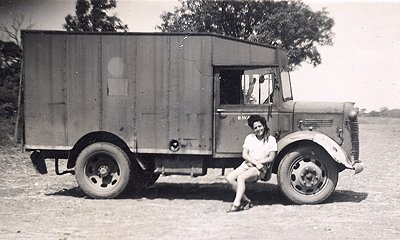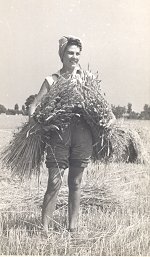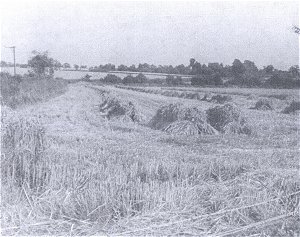Bedfordshire Land Girl Memoir
Bedfordshire Women's Land Army
Stella Goldsmith nee Limon
Page 3
Sticking up for our rights
During that first winter we were still being taken to work in that open lorry so we would arrive in Toddington frozen stiff and more often than not soaked to the skin. We put in a request to the War Ag for a canvas top to be put on the lorry but, in spite of promises, nothing happened. Then we learnt that the same prisoners of war that had been moved from the hostel because it didnt meet the Geneva Convention standards were taken to work in a coach. That did it we refused to go to work until we got our cover. That was the first and only time in my life that Ive been on strike. Instead we worked out in the garden at the back of the hostel, hoeing and weeding that dreadful acre of Brussels sprouts. It wasnt long before a whole contingent of officials from Bedford arrived to threaten us with all sorts of retribution for breaking war regulations but as we were working they couldnt do anything about it and the next day the lorry came with the cover on.

Harvesting
The next thing that really stands out of my time working at Toddington was
harvest time. Having mastered the use of the scythe, we were taken out
 somewhere
between Whipsnade and Studham where a large field had been ploughed for the
first time in living memory and barley sown. The crop had grown to an enormous
size, so tall that it was over that tall Scotsmans head. It made the newspapers
and all manner of big wigs came out to inspect it. Our job was to go round the
field three times with our scythes, making room enough for the tractor and
harvester to work. Oh that barley! Being so tall it was hard not to get the
stuff falling on you, and then we had to sheave it by hand. Those awns (spiky
grain-sheaths) tore our skin to bits and got into those knitted shirts and were
impossible to get out for weeks. To make matters worse in one part of the field
we had disturbed a wasps nest so that whenever we got round to that side we
were attacked by irate wasps. Stooking the stuff (standing the corn sheaves up
close together, so that they were self-supporting and could dry out) is not a
pleasant memory as it was so tall.
somewhere
between Whipsnade and Studham where a large field had been ploughed for the
first time in living memory and barley sown. The crop had grown to an enormous
size, so tall that it was over that tall Scotsmans head. It made the newspapers
and all manner of big wigs came out to inspect it. Our job was to go round the
field three times with our scythes, making room enough for the tractor and
harvester to work. Oh that barley! Being so tall it was hard not to get the
stuff falling on you, and then we had to sheave it by hand. Those awns (spiky
grain-sheaths) tore our skin to bits and got into those knitted shirts and were
impossible to get out for weeks. To make matters worse in one part of the field
we had disturbed a wasps nest so that whenever we got round to that side we
were attacked by irate wasps. Stooking the stuff (standing the corn sheaves up
close together, so that they were self-supporting and could dry out) is not a
pleasant memory as it was so tall.
Another part that had been ploughed by the War Ag was at Chalton where once again there was a record-breaking crop. Here we had to scythe and then do the stooking after the binder. The crop was so heavy that they sent a batch of air force personnel with a couple of low loaders in order to get the wheat safely stacked.
I can recall that summer as being hot and sunny. We had double summer time
then, so we were starting work at seven in the morning and wor king until late
evening. Just over the hill at Chalton there was a firing range and we could see
the red flag flying and we heard the crack of rifles and every so often wed
hear a whine overhead and something would land in a sheaf nearby. We never
thought anything about it until these air men came on the scene. The first time
they heard this whine they flattened themselves on the ground. We just stood
open-mouthed until they dragged us down as well. They explained about the damage
a ricochet bullet could do to you wed never even heard of ricocheting
bullets. The last we actually heard was that the Air Force must have pulled
strings and the firing range wasnt heard again until we cleared the field.
king until late
evening. Just over the hill at Chalton there was a firing range and we could see
the red flag flying and we heard the crack of rifles and every so often wed
hear a whine overhead and something would land in a sheaf nearby. We never
thought anything about it until these air men came on the scene. The first time
they heard this whine they flattened themselves on the ground. We just stood
open-mouthed until they dragged us down as well. They explained about the damage
a ricochet bullet could do to you wed never even heard of ricocheting
bullets. The last we actually heard was that the Air Force must have pulled
strings and the firing range wasnt heard again until we cleared the field.
Page last updated: 17th October 2013

